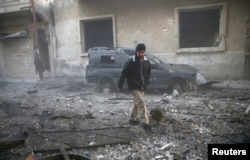ຫົວໜ້າໄກ່ເກ່ຍຂອງອົງການສະຫະປະຊາຊາດ ຮັບຜິດຊອບກ່ຽວກັບການເຈລະຈາສັນຕິພາບ ລະຫວ່າງພັກຝ່າຍຕ່າງໆໃນຊີເຣຍ ກ່າວວ່າ ທ່ານບໍ່ໄດ້ມອງເຫັນວ່າ ຈະເກີດຄວາມກ້າວໜ້າຂຶ້ນໃນທັນທີ ໃນໃກ້ໆນີ້ແຕ່ຢ່າງໃດເລີຍ.
ໃນຄ່ຳຄືນກ່ອນການເຈລະຈາສັນຕິພາບຮອບໃໝ່ ໃນຊີເຣຍ ທ່ານ Staffande
Mistura ທູດພິເສດຂອງອົງການສະຫະປະຊາຊາດ ຮັບຜິດຊອບ ກ່ຽວກັບເລື່ອງຊີເຣຍ
ບໍ່ໄດ້ໃຫ້ຄວາມສຳຄັນ ຕໍ່ຄວາມຄາດໝາຍໃນການເຈລະຈາຄັ້ງນີ້ ແຕ່ກໍກ່າວວ່າ ມີ “ແຮງກະຕຸ້ນທາງການເມືອງ” ທີ່ຈະເຄື່ອນໄຫວໄປໜ້າ ໃນຄວາມພະຍາຍາມທີ່ຈະຍຸຕິສົງຄາມ
ກາງເມືອງ ທີ່ຍືດເຍື້ອຍາວນານມານັ້ນ.
ພັກຝ່າຍຕ່າງໆ ທີ່ເຮັດສົງຄາມ ໃນຊີເຣຍ ໄດ້ພົບປະກັນ ທີ່ນະຄອນເຈນີວາ ເກືອບວ່າປະມານ 9 ເດືອນຜ່ານມາ. ການເຈລະຈາດັ່ງກ່າວໄດ້ປະສົບກັບຄວາມລົ້ມແຫຼວ ຍ້ອນການລະເມີດຂໍ້ຕົກລົງຢຸດຍິງ ຊ້ຳແລ້ວຊ້ຳອີກ.
ທ່ານ de Mistura ຮັບຮູ້ວ່າ ຄວາມສຳເລັດໃນການຟື້ນຟູການເຈລະຈາທີ່ລົ້ມແຫຼວໄປນັ້ນ ສ່ວນໃຫຍ່ແລ້ວແມ່ນຂຶ້ນຢູ່ກັບ ພັກຝ່າຍຕ່າງໆຢູ່ໃນສົງຄາມ ປະຕິບັດຕາມຂໍ້ຕົກລົງຢຸດຍິງຫຼືບໍ່.
ທ່ານໄດ້ກ່າວວ່າ ຣັດເຊຍ ທີ່ໄດ້ບັນລຸຂໍ້ຕົກລົງ ກັບເທີກີ ໃນນະຄອນ Astana ເມືອງຫຼວງຂອງ Kazakhstan ໄດ້ໃຊ້ອິດທິພົນຂອງຕົນເພື່ອຢາກຮູ້ຈັກວ່າ ຂໍ້ຕົກລົງຢຸດຍິງ ທີ່ບອບບາງນັ້ນ ໄດ້ຮັບການປະຕິບັດຢູ່ຕໍ່ມາຫລືບໍ່.
“ມື້ນີ້ ສະຫະພັນຣັດເຊຍ ຫຼັງຈາກຄະນະປະຕິບັດງານຢຸດຍິງ ໄດ້ປະກາດ ໃຫ້ທຸກໆຄົນ ແລະທຸກໆຜູ້ຕາງໜ້າຈາກຫຼາກຫຼາຍປະເທດ ແລະສຳຫຼັບຂ້າພະເຈົ້າເອງ ທີ່ວ່າ ພວກເຂົາເຈົ້າ ໄດ້
ຂໍຮ້ອງຢ່າງເປັນທາງການໃຫ້ລັດຖະບານຊີເຣຍ ຫ້າມບໍ່ໃຫ້ໃຊ້ເຮືອ ບິນຢູ່ຂົງເຂດ ທີ່ກຳນົດໄວ້ ໂດຍຂໍ້ຕົກລົງຢຸດຍິງ ລະຫວ່າງພັກຝ່າຍຕ່າງໆທີ່ເຂົ້າຮ່ວມ ການເຈລະຈາຊີເຣຍນັ້ນ.”
ທ່ານ de Mistura ກ່າວເພີ່ມຕື່ມວ່າ ທ່ານໄດ້ຮ້ອງຂໍໃຫ້ປະເທດອື່ນໆ ທີ່ມີອິດທິພົນ ຕໍ່ກັບພວກຕໍ່ຕ້ານທັງຫຼາຍ ໃຫ້ປະຕິບັດຕາມຂໍ້ຕົກລົງຢຸດຍິງ ແລະບໍ່ໃຫ້ທ້າທາຍເກາະຜິດກັບອີກຝ່າຍນຶ່ງ.
“ພວກເຂົາເຈົ້າບໍ່ມີເຮືອບິນ ແຕ່ວ່າ ພວກເຂົາເຈົ້າ ສາມາດທີ່ຈະເຮັດສິ່ໃນງທີ່ຄ້າຍຄືກັນນີ້ ເມື່ອເວົ້າເຖິງການຫຼຸດຜ່ອນ ໃນການທ້າທາຍເກາະຜິດຕ່າງໆຕໍ່ຝ່າຍໃດໆກໍຕາມ ທີ່ຈະໃຫ້ໂອກາດ ໃນການເຈລະຈາລະຫວ່າງພັກຝ່າຍຕ່າງໆຢູ່ໃນຊີເຣຍ ບໍ່ໃຫ້ໄດ້ຮັບຜົນ ກະທົບ ຍ້ອນການແຕກຫັກລົງ.”
On the eve of a new round of Syrian peace talks, Staffan de Mistura, the U.N. special envoy for Syria, downplayed expectations, but said that there was a "political momentum" to move ahead on efforts to end the long-standing civil war.
Syria's warring parties last met in Geneva nearly nine months ago. That round of talks broke down because of repeated violations of a cease-fire agreement.
De Mistura acknowledged that the successful resumption of the failed negotiations hinged largely on the warring parties abiding by the current cease-fire.
He said Russia, which had worked out the agreement with Turkey in Astana, the capital of Kazakhstan, was using its influence to see that the fragile cease-fire held.
"Today, the Russian Federation after the cease-fire task force did announce to everyone and every country present and to myself that they have formally requested the government of Syria to silence their own skies in the areas attached by the cease-fire during the intra-Syrian talks."
De Mistura added that he has asked other countries with influence on the opposition parties to have them stick to the cease-fire and not provoke the other side.
"They do not have airplanes but they can do something similar in terms of reducing any type of provocation on any side to give a better chance to the intra-Syrian talks not to be affected by breakdowns."
The U.N. envoy warned that there were, what he called "spoilers," who would try to provoke one side or the other to walk out of the talks or to refuse to talk.
"We will try to control it," he said. "It is time to talk and fight on the table, through the table, but not in the field."
Syria's nearly six-year-long civil war has killed around 400,000 people, displaced more than 6 million inside Syria, half of them children and prompted nearly 5 million to flee as refugees into neighboring countries. An estimated 13.5 million people need humanitarian assistance.
De Mistura said the more inclusive the talks, the better the chance of success. The envoy noted that he was unable to get the assent of the parties to include women, who make up 52 percent of the Syrian population, in the talks.
Therefore, he said, he has established a Syrian Women's Advisory Board to participate in the talks in a consultative capacity.
"The first meeting of today was with a group of seven women - Syrian women," he said. "All of them united by one fact - they're being either detainees or tortured or abducted. Or they have their mothers, daughters or wives of detainees or abducted people."
"Detainees are those by the government - thousands - and abducted are those by the opposition," he said. "We should never forget the suffering of so many Syrians on one side and the other too during this conflict."
De Mistura said he was not sure what role the United States would play in the negotiations, but understood that the new Trump administration needed time to devise a new strategy.
"They have announced that they want to revisit their strategy regarding the fight against Daesh, IS, and that by implication what they are doing in Iraq and in Syria…So, I would say let us wait for that," said de Mistura, using acronyms for Islamic State.
He noted, however, that the U.S. official who had attended previous intra-Syrian talks also would be present at this round. "So, I am convinced that they will be very supportive with whatever we try to do."
The U.N. envoy said he will be meeting with the participants Thursday morning in a series of bilateral talks to discuss how to proceed with the negotiations.
In previous rounds, the parties held indirect talks, with de Mistura shuttling from one delegation to the other. It is not clear if this system will continue or if the delegations will agree to meet face-to-face.
De Mistura said the agenda will focus on three items: the establishment of a credible, inclusive and non-sectarian governance, the drafting of a new constitution, and free and fair elections under U.N. supervision.
The envoy said he will not agree to any preconditions and fully expected the talks to be serious and substantive.
"Am I expecting a breakthrough? No, I'm not expecting a breakthrough. But, I am expecting and determined for keeping a very proactive momentum," he said.
"We have to…outpace those few but clear spoilers with the momentum on the political track, and I think we can aim at that."





